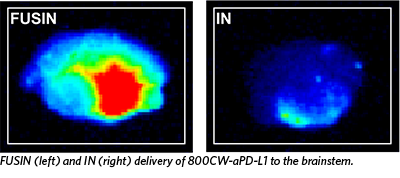Key Points
- Cancer immunotherapy, although effective for various types of cancer, has not yet been effective for gliomas.
- A research team led by Hong Chen, PhD, used focused ultrasound to facilitate intranasal brain delivery, allowed administering effective levels of immune checkpoint inhibitors to the brain.
- In the preclinical study, the new method enhanced the accumulation of the cancer immunotherapy by approximately four-fold.
Cancer immunotherapy, although effective for various types of cancer, has not yet been effective for gliomas. A research team at Washington University of St. Louis led by Hong Chen, PhD, used focused ultrasound to facilitate intranasal brain delivery, which allowed them to administer effective levels of immune checkpoint inhibitors to the brain. In the preclinical study, the new method successfully enhanced the accumulation of the immune checkpoint inhibitors by approximately four-fold.
Dr. Chen’s technique, called focused-ultrasound-mediated intranasal brain drug delivery (FUSIN), delivered a labeled anti-programmed death ligand 1 (aPD-L1) antibody with the assistance of systemically injected microbubbles. The aPD-L1 accumulation in the targeted brainstem region averaged 4.03- and 3.74-fold, respectively, in normal mice and mice with glioma when compared with intranasal administration alone. The aPD-L1 was found in the perivascular spaces after intranasal delivery alone but reached a greater penetration depth more efficiently with FUSIN and was co-localized with the tumor cells.

 Focused Ultrasound-Enhanced Delivery of Intranasally Administered Anti-Programmed Cell Death-Ligand 1 Antibody to an Intracranial Murine Glioma Model
Focused Ultrasound-Enhanced Delivery of Intranasally Administered Anti-Programmed Cell Death-Ligand 1 Antibody to an Intracranial Murine Glioma Model